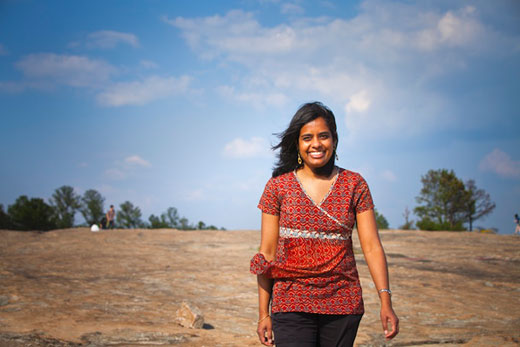A favorite biology professor introduced Nitya Jacob to Arabia Mountain when she was a student at Agnes Scott College. Sandra Bowden took her botany class on field trips to the Georgia granite outcrop.
"I remember thinking how weird and otherworldly the outcrop looked, with strange plants, unique to that habitat," Jacob says. "I loved getting to see these plants in the wild that I had been learning about."
Now Jacob is an assistant professor of biology at Emory's Oxford College, introducing a new generation of students to Arabia Mountain. She developed a lab module that trains freshmen and sophomores to collect samples on the outcrop, then investigate microbial diversity through DNA isolation and sequencing.
"I want my students to be aware of their biological surroundings," Jacob says. "It's so easy to go about life without ever thinking about what's around you."
The popular lab module, which Jacob has been teaching and refining for six years, is one of only 15 winners nationwide of the 2011 Science Prize for Inquiry-Based Instruction. The journal Science is publishing Jacob's paper, "Investigating Arabia Mountain: A Molecular Approach," in its next issue, so that other science teachers can emulate her methods.
"I always had this dream of publishing in Science, like a lot of scientists do," Jacob says. "But when I decided to focus on teaching, I thought, 'There goes any chance of seeing my name in Science.' I'm just blown away by this."

